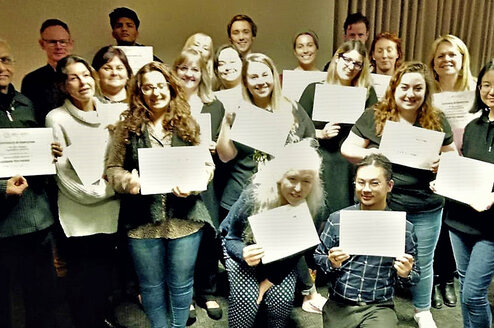TEFL Courses in New Zealand
TEFL Courses in New Zealand
About
New Zealand’s remote location may make it one of the hardest destinations to reach, but once you arrive in the country of majestic fiords, artisanal food products and dramatic surf swells, you’ll know it was worth the journey.
New Zealanders, or Kiwis, are known for their generosity and cheerfulness, if not also their penchant for having a good time and a sharp sense of humor. In this country, their Maori and Pacific Island roots play a strong part in local culture, as does rugby and the idea of ‘fair go,’ or giving everyone a chance.
Studying your TEFL certification in New Zealand gives you the opportunity to access high-quality training in one of the most breathtakingly stunning natural landscapes in the world. Teaching opportunities are fewer than other countries and most foreigners teach on a short-term basis, but from Auckland’s stunning harbor and underground music scene to the crystal blue waters and hugging cliffs of Milford Sound, it will be an unforgettable experience.
Course Types
In New Zealand, students will find courses to cater to all preferences and learning needs. Each include classroom instruction and a required practical teaching component.
TEFL
These courses offer a variety of lengths and credit hours, from four to ten weeks and 120-180 hours, depending if you wish to finish as fast as you can, or combine a TEFL course with other commitments, such as a job or other study. Each option requires up to twenty practicum hours.
TESOL
TEFL-earning students in New Zealand have choices of programs that range between a 120-hour TESOL certification and a 600-hour TESOL diploma.
CELTA
Academies offer four- or five-week CELTA (Certificate in English Language Teaching to Adults) courses in New Zealand.
Planning Your Trip
When to Take Your TEFL in New Zealand
TEFL-granting academies offer courses throughout the year, however, you may wish to align the end of your course with peak hiring times, which happen November through January.
Popular Destinations for TEFL Courses in New Zealand
New Zealand’s population is concentrated in select cities instead of being spread throughout the country. For TEFL students, the best places to live is in Auckland, followed by Wellington and Christchurch. Each of these cities is known for its welcoming people and opportunities to dive into culture and nightlife. Auckland, NZ’s largest city and international hub, has a sunny and relatively mild climate year round with a bearable winter. Christchurch, while still recovering from a devastating earthquake in 2011, there has been an urban revival in recent years breathing new life to the city. Wellington is the nation's capital and government hub known as one of the windiest cities in the world. While Auckland and Wellington are along the coast, Christchurch is an inland city, though water isn’t far away.
What to Look For in a TEFL Course in New Zealand
Because New Zealand’s English teaching market is smaller than other countries, it’s also more competitive. Choosing a TEFL course that guarantees job placement -- or at least offers job placement assistance -- will be beneficial. Additionally, some courses offer more hands-on support and materials to ease your way into teaching, such as ideas for activity planning.
Your TEFL course should reflect your preferences. As a foreigner in New Zealand, do you want to be in a course targeted towards other foreigners, or one for locals? Are planned social events important to you, or are you more independent? Do you wish to study part time and take advantage of short term work visa (available for people under 31 from participating countries), or would you rather study full time and get a teaching job as soon as possible?
Besides those important aspects, make sure your TEFL course material includes everything you’ll need to be a successful teacher. Lookout for things like English linguistics, teaching theories, classroom management, and conflict resolution skills, among other considerations, such as student-teacher ratio.
Health & Safety
In many aspects, New Zealand is a dream destination, with very low instances of crime and disease. Falling ill or getting hurt in New Zealand is no problem, as their healthcare system is well known for its outstanding care. Tap water is safe to drink. Foreigners living in the country should take any standard safety precautions they normally wood in their home countries, including guarding valuables and watching alcohol drinks closely.
Because New Zealand is an ideal destination for outdoor and extreme sport adventures, be sure to come well prepared for situations where you may be new to the activity. Hire a guide or be sure to properly research the area, and carry first aid kits and lots of water!
Post-TEFL Tips
When to Apply For Jobs in New Zealand
If TEFL earners wish to teach in public schools, hiring usually takes place in January, just before the start of the academic school year in February/March. However, many English teachers find short-term jobs working in summer camps for international students. Those will hire in November and December, just before summer holiday.
Average Salary of Post-TEFL Jobs in New Zealand
Compared to other countries, the salary of a post-TEFL graduate in New Zealand is quite high. Teachers can expect to earn around $3,000 USD a month. This salary can be increased by teaching private classes, which start at $20 an hour.
Tips for Finding a Job in New Zealand
While you may be drawn to the remoteness of the North Island’s volcanoes or hot springs, the best place to find a job is one of the major cities, including Auckland, Queenstown, Wellington and Christchurch. It’s a great idea to present your curriculum vitae (CV) in person to academies and schools. To find openings, scan job listings on websites such as SEEK and Trade Me and word of mouth.
It’s important to note that for official government schools, TEFL holders will need to also obtain other certifications, including things like an international qualifications assessment.
Because New Zealand is a primarily English-speaking country, opportunities for ESL are more limited than in other countries. Make sure to give your application an extra edge by networking and being personable and enthusiastic, in addition to expressing an appreciation for the country’s indigenous heritage.









